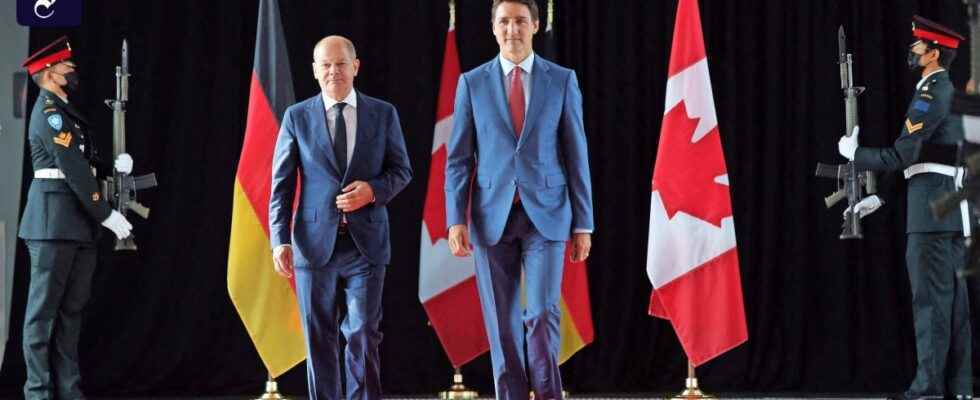BUndescancellors are usually received with military honors when traveling abroad. These are often long rituals in front of mighty palaces, interspersed with a certain bombast. The complete opposite took place on Monday morning when Canadian Prime Minister Justin Trudeau welcomed Olaf Scholz. In Montreal, not in the capital Ottawa, Trudeau received Scholz in a science center.
The two of them did not walk through a court of honor, but walked dynamically through a corridor that, with its gray pipes on the ceiling, was reminiscent of a factory hall. Red carpet, some soldiers on the left, some on the right, it wasn’t even a minute before they turned right into a corridor and headed for the conference room. The usual music of a military band was also missing. But that wasn’t an expression of coolness, rather it suited two dynamic politicians who, according to them, have a friendly relationship and a lot to talk about. No big rituals, no time to waste. That seemed to be the motto.
Scholz flew from Berlin to Canada on Sunday afternoon. Federal Economics Minister Robert Habeck of the Greens traveled with him. It’s about two things. In order to reduce Germany’s large and overly one-sided dependence on Russian energy sources, other sources must be found, also in the long term. The Chancellor is also doing a lot to strengthen partnerships with countries with which Germany has close ties and wants to have even closer ties. Canada is very high on Scholz’s list.
A “reliable democracy” as an energy supplier
Scholz found benevolent words to describe Canada’s special role in Berlin. With hardly any other country outside the European Union “we have such close and friendly ties” as with Canada, he said. You not only share common values, but also a similar view of the world. “The country has similar rich natural resources as Russia – with the difference that it is a reliable democracy.”
However, agreements that should result in a short-term closing of German supply gaps are not to be expected from the trip. It was heard in German government circles that they were not coming to Canada expecting to reach agreements on this within the next one to two years. Rather, it is about a “medium-term perspective,” it said. This applies in particular to the production of hydrogen. Scholz and Trudeau clearly emphasized its importance for the two countries’ renunciation of fossil fuels at their joint appearance on Monday.
At the end of the trip, a hydrogen agreement between Germany and Canada is to be signed on Tuesday. The goal is to get hydrogen from the Canadian Atlantic province of Newfoundland and Labrador by 2025. The foundations for this had already been laid before Russia attacked Ukraine, when a corresponding energy partnership was concluded between the two countries in 2021. So-called green hydrogen, i.e. hydrogen produced without using fossil fuels, is to be produced with the help of wind turbines in Newfoundland and then shipped to Germany.
LNG terminal is not ready yet
It is more difficult with liquid gas. It is true that Germany is working at great speed to soon have terminals for importing liquefied gas delivered by ship (these are also to be designed in such a way that they can also be used for hydrogen). However, for the time being, LNG will come from the United Arab Emirates. Efforts to get something like this from Qatar in the near future are faltering.
Canada is not an option as a future supplier. The country does not currently have an operational LNG terminal. One is under construction, but on the West Coast, destined to supply gas to Asia. Trudeau said one of the challenges related to LNG is the level of investment in infrastructure. After all, he said when he appeared at the Chancellor’s side: “However, we are examining all other options to help the Germans and Europeans in the short term, as they will face a real challenge next winter.”
Although energy policy is the focus of the trip, it is also and especially about maintaining good contacts with Canada. The federal government spoke of an “intensive visit to friends”. It is one of the “particular consequences of the turning point” that one assures oneself of one’s close partners and moves closer together.
As a very concrete example of coming together, both Scholz and the Canadian Prime Minister highlighted Ottawa’s decision to send a turbine for transporting gas from Russia through pipes back to Germany, from where it is to be transported on to Russia. With the claim that gas cannot be delivered to Germany because of the missing turbine, Russian President Vladimir Putin only wants to split the West. That was not successful, Olaf Scholz and Justin Trudeau agreed.
